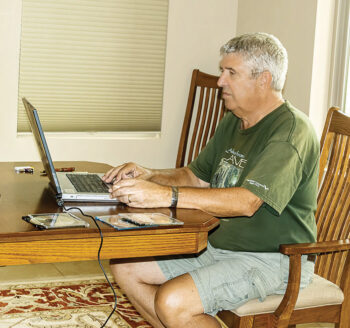
Jim Burkstrand performs “brain surgery” on one of the donated laptops. (Photo by Marilyn Burkstrand)
Peggy McGee
Marisa Acosta, one of the recent Women-in-Transition scholarship winners, is a teacher at the San Xavier Mission School in Tucson, where many of the students live at or below the poverty level. She reported that online learning was presenting a real challenge for them, since many did not have a computer at home from which they could access their classes.
The word went out to members of TWOQC’s Scholarship committee and, in true Quail Creek fashion, they or some of their friends quickly came up with eleven computers that they were willing to donate for the students’ use. But the computers, nine laptops and two desktops, weren’t ready for the students yet.
First, they had to be “sanitized” to remove all personal information relating to the donor, and then reconfigured to become pseudo Chromebooks. Who to call for assistance? Jim Burkstrand, a member of the QC Computer Club and unofficial member of the Scholarship committee, because of the technical assistance he has provided over the years, came to the rescue. Jim replaced their operating systems (OS) with an OS from Neverware that had over 95% of the capabilities of the Google supplied Chrome OS. A couple of them were left with advanced Windows operating systems and were configured with Google and Google Drive for the kids. Most importantly, all became capable for use in remote learning.
The renovated laptops have been delivered to the school where they are enabling the middle school students to pursue their studies from their homes. The two desktop computers will remain in the classroom for when the students return to school under the hybrid learning protocol.
